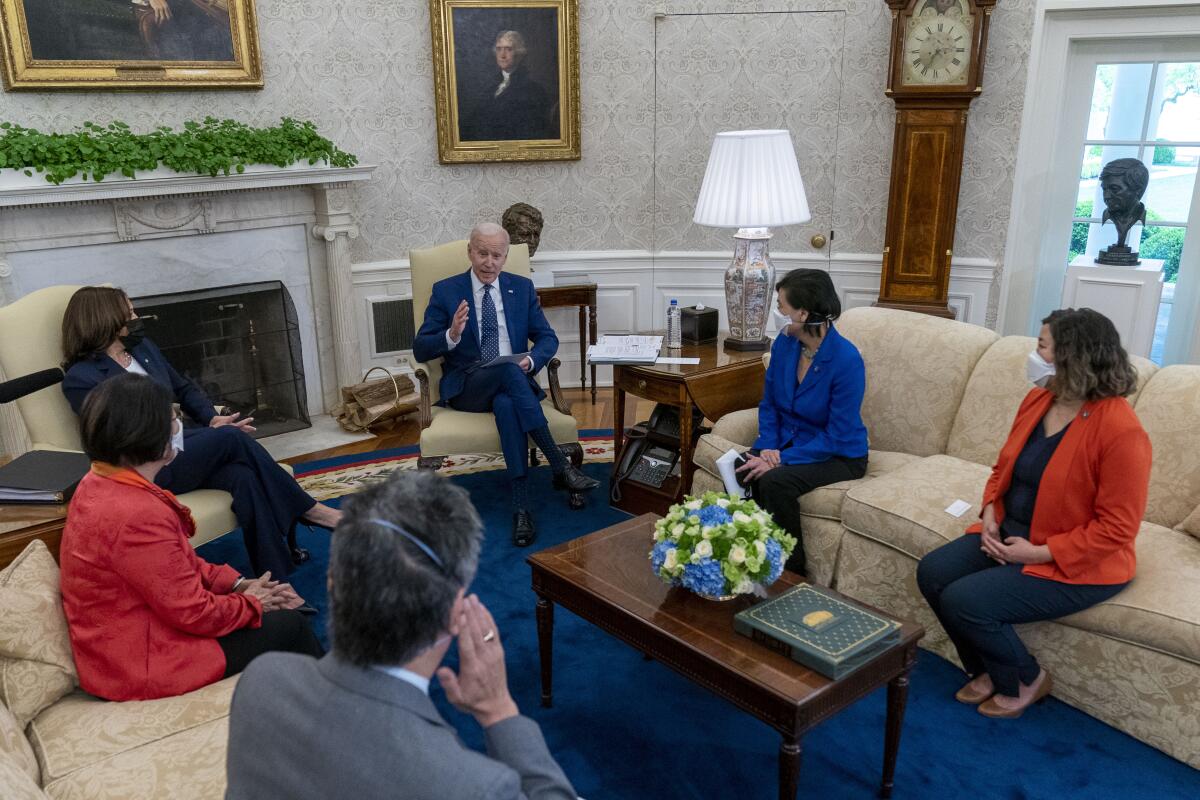Biden meets with Congress’ Asian American leaders as Senate takes up a hate crimes bill

WASHINGTON — President Biden met Thursday with leaders of the Congressional Asian Pacific American Caucus, which has pushed for more Asian Americans in his administration and for a law to combat the sort of hate crimes against the group that have risen since the COVID-19 pandemic began in China.
“We need to stand with the AAPI community,” Biden said, referring to Asian Americans and Pacific Islanders, before reporters were ushered out of the Oval Office ahead of the private meeting.
He said he and Vice President Kamala Harris — the first vice president of Asian descent, who sat by his side — were “heartened” by the Senate’s preliminary 92-6 vote Wednesday to begin debate on bipartisan legislation that would strengthen hate crime reporting and speed up the Justice Department’s review of those crimes.
The impetus for the legislative action, and for Asian Americans’ advocacy more broadly, was the March 16 killings at three Atlanta-area spas of eight people, six of them Asian American women, after months of violence nationwide against people of Asian heritage. The White House meeting came a day after the president hired a new advisor to placate two lawmakers who have criticized the lack of Asian Americans in his Cabinet.
On Wednesday, Biden appointed Erika Moritsugu as his administration’s liaison for Asian Americans and Pacific Islanders, following through on a promise to two Asian American senators — Tammy Duckworth of Illinois and Mazie Hirono of Hawaii — who threatened last month to oppose future nominees if he didn’t increase the group’s representation in his administration.
Moritsugu, who is of Japanese and Chinese ancestry, previously served as Duckworth’s general counsel and as an assistant housing secretary during the Obama administration.
Hirono and Duckworth attended Thursday’s meeting, along with five Democratic House members, three from California: Reps. Judy Chu of Monterey Park, Mark Takano of Riverside and Doris Matsui of Sacramento. Reps. Grace Meng (D-N.Y.) and Kai Kahele (D-Hawaii) also took part. The lawmakers are members of the caucus’ executive committee.
“The first words he said to us is that tackling racial equity is a top priority in his administration,” Chu said in an interview after the meeting. “The fact that he had this meeting with us within the first 100 days of taking office showed that he actually meant this.”
A White House readout noted that Biden emphasized his administration’s commitment to diversity throughout the executive branch and spoke about shared priorities related to his proposed infrastructure package. It did not, however, refer to a discussion of the Atlanta shootings. Attendees, concerned that local authorities have yet to classify it as a hate crime, requested that Biden call on the Justice Department to investigate.
Biden, Chu said, was reluctant to intervene and risk politicizing the matter but urged lawmakers to appeal to the department directly.
During his first days in office, Biden made clear that he was serious about taking action against anti-Asian American hate crimes, which rose by nearly 150% last year, according to a study by the Center for the Study of Hate and Extremism at California State San Bernardino.
As he signed four executive orders addressing racial equity in January, including one directing more Justice Department resources to tracking hate crimes against Asian Americans, Biden called the rise in such violence “unacceptable” and “un-American.” He has also harshly criticized President Trump, who branded the coronavirus as “the China virus” and “the Kung Flu” as part of his effort to shift blame for the pandemic to China.
Senate Majority Leader Charles E. Schumer (D-N.Y.) said Thursday that he expects that Democrats and Republicans “will be able to figure out an appropriate number of reasonable, germane, non-gotcha amendments for the Senate to consider.”
Although Senate Minority Leader Mitch McConnell (R-Ky.) has yet to explicitly state that he and other Republicans may support the bill, Schumer predicted it would be approved by the Senate by next week.
More to Read
Get the L.A. Times Politics newsletter
Deeply reported insights into legislation, politics and policy from Sacramento, Washington and beyond. In your inbox three times per week.
You may occasionally receive promotional content from the Los Angeles Times.












